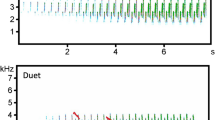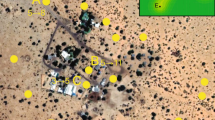Abstract
We removed the mates of ten male black-capped chickadees (Pares atricapillus) during the nest-building period to determine the effect of female presence on dawn singing. During the first dawn chorus following mate removal, males sang significantly longer, increased movement within their territory, and increased the percentage of their territory covered while singing. After the female was returned, these parameters returned to the pre-removal values. Males did not alter the frequency range or modal frequency of their songs when the mate was removed, nor did they change the degree of frequency shifting in the fee-bee song. We conclude that dawn singing in the black-capped chickadee acts, in part, as an intersexual signal, and that the behavior of frequency shifting in the song may be directed more toward rival males than females.
Similar content being viewed by others
References
Alatalo RV, Glynn C, Lundberg A (1990) Singing rate and female attraction in the pied flycatcher: an experiment. Anim Behav 39:601–602
Baker MC, Bjerke TK, Lampe HU, Espmark YO (1986) Sexual response of female great tits to variation in size of males' song repertoire. Am Nat 128:491–498
Baker MC, Bjerke TK, Lampe HU, Espmark YO (1987) Sexual response of female yellowhammers to differences in regional dialects and repertoire sizes. Anim Behav 35:395–401
Björklund M, Moller AP, Sunderland J, Westman B (1992) Female great tits, Parus major, avoid extra-pair copulation attempts. Anim Behav 43:691–693
Catchpole CK, Dittami J, Leisler B (1984) Differential responses to male song repertoires in female songbirds implanted with estradiol. Nature 312:563–564
Cuthill I, Hindmarsh A (1985) Increase in starling song activity with removal of mate. Anim Behav 33:326–335
Dixon KL, Stefanski RA (1970) An appraisal of the song of the black-capped chickadee. Wilson Bull 82:53–62
Eriksson D, Wallin L (1986) Male bird song attracts females -a field experiment. Behav Ecol Sociobiol 19:297–299
Ficken MS, Ficken RW, Witkin SR (1978) Vocal repertoire of the black-capped chickadee. Auk 95:34–48
Hill BG, Lein MR (1987) Function of frequency-shifted songs of black-capped chickadees. Condor 89:914–915
Horn AG, Leonard ML, Ratcliffe L, Shackleton S, Weisman RG (1992) Frequency variation in the songs of black-capped chickadees (Parus atricapillus). Auk 109:847–852
Krebs J, Ashcroft R, Webber M (1978) Song repertoires and territory defence in the great tit. Nature 271:539–542
Krebs JR, Avery M, Cowie RJ (1981) Effect of removal of mate on the singing behavior of great tits. Anim Behav 29:635–637
Kroodsma DE, Bereson RC, Minear E (1989) Use of song types by the chestnut-sided warbler: evidence for both intra- and intersexual functions. Can J Zool 67:447–456
Logan CA, Hyatt LE (1991) Mate attraction by autumnal song in the northern mockingbird (Mimus polyglottus). Auk 108:429–432
Mace R (1986) Importance of female behavior in the dawn chorus. Anim Behav 34:621–622
Mace R (1987) The dawn chorus of the great tit Parus major is directly related to female fertility. Nature 330:745–746
McGregor PK (1991) The singer and the song: on the receiving end of bird song. Biol Rev 66:57–81
Møller AP (1991) Why mated songbirds sing so much: mate guarding and male announcement of mate fertility status. Am Nat 438:994–1014
Morton ES, Young K (1986) A previously undescribed method of song matching in a species with a single song “type”, the kentucky warbler (Oporornis formosus). Ethology 73:334–342
Mountjoy DJ, Lemon RE (1991) Song as an attractant for male and female European starlings, and the influence of song complexity on their response. Behav Ecol Sociobiol 28:97–100
Otter K, Ratcliffe L, Boag PT (in press) Extra-pair paternity in the black-capped chickadee. Condor
Pårt T (1991) Is dawn singing related to paternity insurance? The case of the collared flycatcher. Anim Behav 41:451–456
Ratcliffe LM, Weisman RG (1985) Frequency shift in the fee bee song of the black-capped chickadee. Condor 87:555–556
Rice WR (1989) Analyzing tables of statistical tests. Evolution 43:223–225
Searcy WA (1984) Song repertoire size and female preference in song sparrows. Behav Ecol Sociobiol 14:281–286
Searcy WA, Marler P (1981) A test for responsiveness to song structure and programming in female sparrows. Science 213:926–928
Shackleton SA (1991) The singing behavior of the black-capped chickadee (Parus atricapillus). M.Sc. Thesis, Queen's University, Kingston, Ontario
Shackleton SA, Ratcliffe L, Weary DM (1992) Relative frequency parameters and song recognition in black-capped chickadees. Condor 94:782–785
Smith SM (1988) Extra-pair copulations in black-capped chickadees: the role of the female. Behavior 107:15–23
Smith SM (1991) The black-capped chickadee; behavioral ecology and natural history. Comstock Publishing, Cornell University Ithaca, New York
Author information
Authors and Affiliations
Additional information
Correspondence to: K. Otter
Rights and permissions
About this article
Cite this article
Otter, K., Ratcliffe, L. Changes in singing behavior of male black-capped chickadees (Parus atricapillus) following mate removal. Behav Ecol Sociobiol 33, 409–414 (1993). https://doi.org/10.1007/BF00170256
Received:
Accepted:
Issue Date:
DOI: https://doi.org/10.1007/BF00170256




